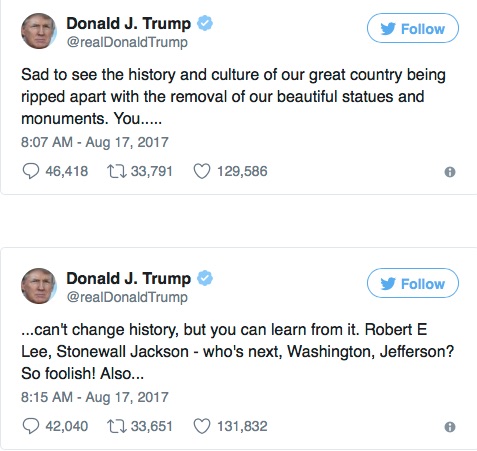
Aug 18, 2017

Take them out of public spaces and move them to museums
Donald Trump, our nation’s historically unpopular president, went on a Twitter rant about Confederate monuments and the growing movement to remove them.
Robert E. Lee, the general featured in many of these statues (most of which were erected after the turn of the century—including a flurry in the 1950s and 1960s), was against the idea of Confederate monuments and said so on multiple occasions:
The first was to Thomas Rosser, a former Confederate general who in 1866 queried Lee about a proposed commemorative monument.
“My conviction is,” Lee wrote, “that however grateful it would be to the feelings of the South, the attempt in the present condition of the Country, would have the effect of retarding, instead of accelerating its accomplishment; & of continuing, if not adding to, the difficulties under which the Southern people labour.”
He reiterated these feelings in another letter three years later:
The second came in 1869, when Lee declined an invitation from the Gettysburg Battlefield Memorial Association to help mark the positions of the troops in that 1863 battle with granite memorials.
He responded that his “engagements will not permit me to be present.” But even if he were able to attend, he added, he thought it “wiser … not to keep open the sores of war but to follow the examples of those nations who endeavored to obliterate the marks of civil strife, to commit to oblivion the feelings engendered.”
In fact, the great-great grandchildren of Robert E. Lee, Jefferson Davis and Stonewall Jackson have all issued statements approving the removal of these statues from public grounds:
“Eventually, someone is going to have to make a decision, and if that’s the local lawmaker, so be it. But we have to be able to have that conversation without all of the hatred and the violence. And if they choose to take those statues down, fine,” Robert E. Lee V, 54, of Washington DC, told CNN.“Maybe it’s appropriate to have them in museums or to put them in some sort of historical context in that regard,” he added.
Bertram Hayes-Davis, great-great grandson of Jefferson Davis:
“In a public place, if it is offensive and people are taking issue with it, let’s move it. Let’s put it somewhere where historically it fits with the area around it so you can have people come to see it, who want to understand that history and that individual.”
In a public letter published at Slate, William Jackson Christian and Warren Edmund Christian, two great-great grandsons of Stonewall Jackson were crystal clear in their desire to see the monuments removed from public spaces:
We are native Richmonders and also the great-great-grandsons of Stonewall Jackson. As two of the closest living relatives to Stonewall, we are writing today to ask for the removal of his statue, as well as the removal of all Confederate statues from Monument Avenue. They are overt symbols of racism and white supremacy, and the time is long overdue for them to depart from public display. Overnight, Baltimore has seen fit to take this action. Richmond should, too.
They went on to say the family preferred to celebrate the actions of Stonewall Jackson’s sister:
While we are not ashamed of our great-great-grandfather, we are ashamed to benefit from white supremacy while our black family and friends suffer. We are ashamed of the monument.
In fact, instead of lauding Jackson’s violence, we choose to celebrate Stonewall’s sister—our great-great-grandaunt—Laura Jackson Arnold. As an adult Laura became a staunch Unionist and abolitionist. Though she and Stonewall were incredibly close through childhood, she never spoke to Stonewall after his decision to support the Confederacy. We choose to stand on the right side of history with Laura Jackson Arnold.

